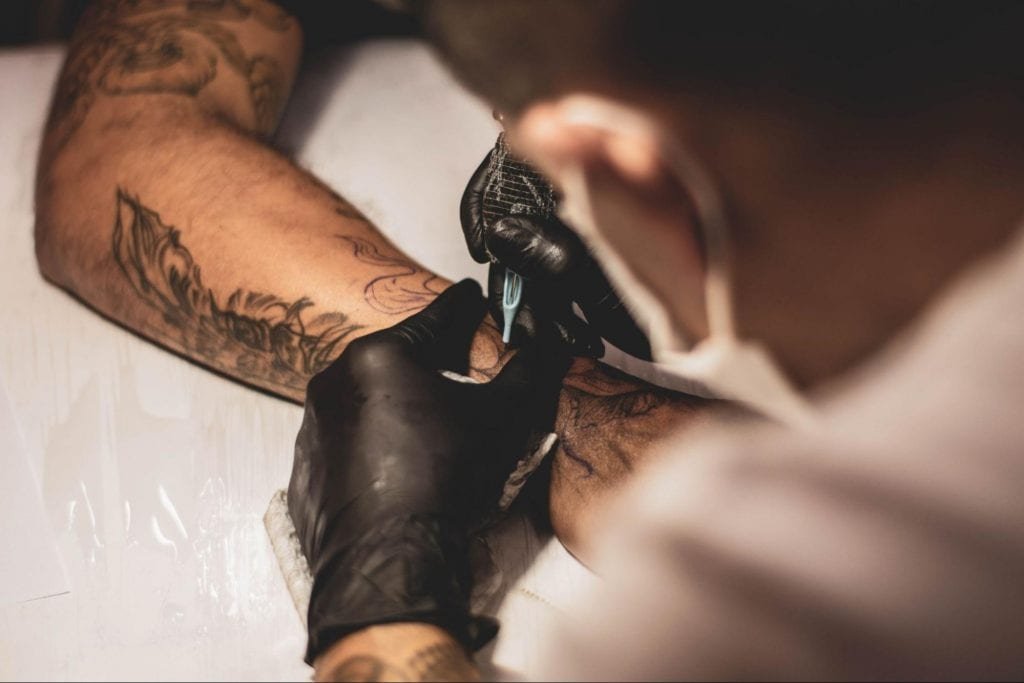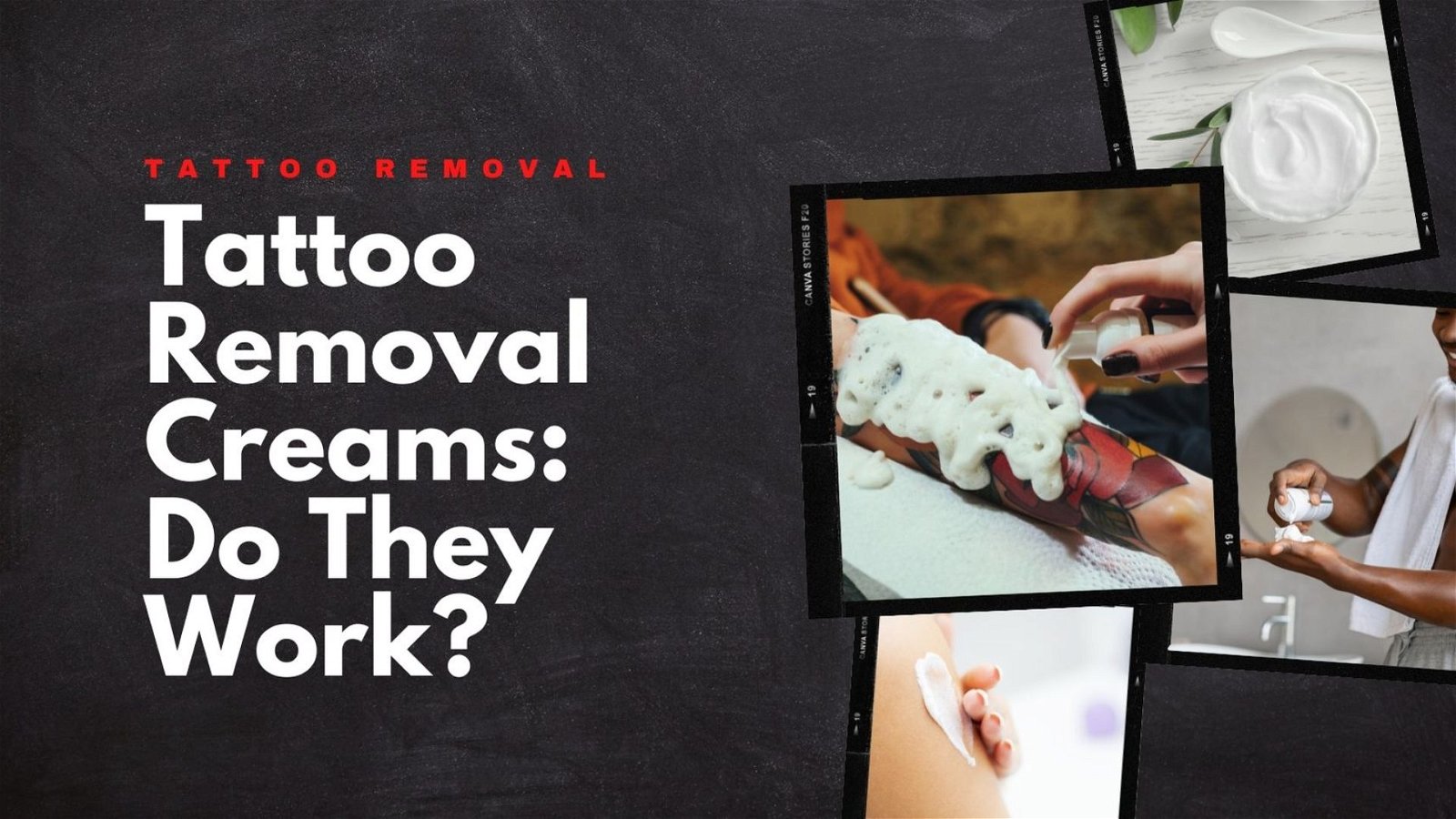There are loads of different tattoo removal creams on the market today, each claiming to be the “#1 Tattoo Removal Cream”, – but do tattoo removal creams work?
Although these companies claim their tattoo cream works, can you trust them to remove your tattoo, and are they worth buying?
There’s been no evidence that these creams effectively remove a tattoo. The best they could do is fade the tattoo a little bit, but even that could take months. The side effects of tattoo removal creams can be harsh, including scarring and burning.
Read on to learn more about tattoo removal creams and other safer and more effective ways to get rid of your tattoo.
Why People Want To Get Tattoo Removed From Their Skin
The tattoo removal process can be painful and expensive. It can easily cost thousands of dollars and take years to complete.
However, some companies promote ads that offer a more effortless and over-the-counter solution to remove tattoos — tattoo removal creams — making many people purchase and opt for this easier method.
But why do people want to remove their tattoos? Here are some reasons:
- A bad breakup
- Pursuing a career
- Starting a family
Whatever the reason, tattoo removal creams are highly sought after but do they work?
What’s In a Tattoo Removal Cream?
All tattoo removal creams mainly consist of one active chemical — trichloroacetic acid (TCA).
TCA takes away the epidermis and goes through some underlying muscles to remove most of the ink. TCA can sometimes go as far down the dermis (the thicker skin layer below the epidermis) and increase dermal damage if concentration increases.
Do Tattoo Removal Creams Really Work?
Several studies have been done for tattoo removal creams that have yielded no results. We’ll touch on one of these studies by Mayo Clinic.
“There’s no evidence that tattoo removal creams work. At best, tattoo removal cream might fade or lighten a tattoo. However, the tattoo will remain visible, and skin irritation and other reactions are possible. Remember, tattoos are meant to be permanent. Because the ink is placed beneath the top layer of the skin, complete removal of a tattoo is difficult. If you’re interested in tattoo removal, don’t attempt it yourself. Ask your dermatologist about laser surgery or other options for tattoo removal.”
No studies have shown that tattoo removal creams do anything but lighten the appearance of tattoos. Some find this alternative method more favourable because it’s far cheaper than laser surgery – which can cost hundreds for just one session.
What’s the Best-Case Result?
The best case for tattoo removal creams is that they fade tattoos to a certain extent. Many people have found that tattoo removal creams only lighten the appearance of their tattoos and don’t remove them altogether.
There are benefits to tattoo removal creams, but it is not worth the risk. These creams may help fade tattoos by at least 25% in 8 weeks of daily use. They are often inexpensive and easy to find over-the-counter.
But you should know that most of these removal creams have no real proof that they remove tattoos. They may irritate the skin and cause blistering and scarring. The chemicals can be carcinogenic (cancer-causing) if used incorrectly or incorrectly.
Can These Creams Be a Potential Health Risk?
Is it safe to use these creams on your body? Do you know what’s in them, and can they harm you or cause an allergic reaction if misused?
Yes, there can be severe side effects, and you can permanently damage the skin.
Some of the severe side effects include
- permanent scarring
- hyperpigmentation
- chemical burns
- skin discolouration
- inflammation
- redness
It is not recommended that you attempt tattoo removal by yourself at home with one of these creams. These are potent chemicals and can cause serious injury if misapplied (or in the right way but used in excess). It’s best to leave this process to the professionals.
You should also take care when applying fade creams if you have a face tattoo, as there is more skin on the face, and it is more sensitive than other parts of your body.
Different Methods To Remove Your Tattoos

If you want to remove your tattoo but are worried about the side effects of using tattoo removal creams, consider tattoo removal options. Let’s explore tattoo removal costs and methods used.
Laser Surgery
Most dermatologists recommend tattoo removal laser surgery if you want to remove a tattoo. This is the only method that will break down and fade inked particles until they are clear enough for your body to absorb and heal properly. Tattoo laser removal also hurts, so that’s something to keep in mind.
This treatment may cost you $200 to $500 per session, depending on your tattoo size and the type of ink used.
A single tattoo removal session won’t work. Removing it may take more than one session, and an entire course of laser treatments could cost you $1,000 or more. Laser tattoo removal does work and is one of the most effective methods.
Surgical Excision
Another option is surgical excision if you want a tattoo removed but don’t have the money for laser treatment.
This method doesn’t break down the ink particles or fade them out.
Instead, it cuts out each layer of your skin that contains inked particles and stitches it back together after removing what’s inside.
The cost of surgical excision is somewhere around $1,000 to $2,500 depending on the size and location of your tattoo.
Dermabrasion
This method is slightly less expensive than surgical excision, and it can be used on larger tattoos.
In this method, a grinding tool removes the epidermis, removing the parts that contain the ink particles.
It may take up to six months for your tattoo to fade after this procedure, and it could cost somewhere between $1,000 and $5,000 or more.
Natural Remedies
One of the most popular natural remedies is lemon juice to fade out a tattoo.
The theory behind this technique is that lemon juice contains d-limonene, which will strip away top layers of skin and remove tattoo ink.
But this method does not entirely remove the tattoo. It’s also relatively risky and can cause inflammation and blistering if not used properly.
Remember that natural remedies are not recommended in removing tattoos due to their under-researched nature, and seeking professional medical advice is a must before considering this method.
Tattoo Cover-Up
If your purpose for removing your tattoo is because of a bad breakup or a change of heart, consider a tattoo cover-up instead.
Covering up your tattoos can be just as hard as removing them – depending on the size and location – and it may require some touch-up sessions to achieve full results. Learn more about how many tattoo removal sessions you’ll need.
Covering them up with clothing or makeup is another way of dealing with it for people who don’t mind keeping their tattoos but want them to be less noticeable.
Final Thoughts
Be sure to research before trying out any tattoo removal creams on the market, especially if you plan to use them daily.
They can be dangerous if misapplied or used for too long. Beware that these products simply can’t do what a good laser treatment can, and you should only expect them to lighten your tattoo a bit.
They also can irritate the skin or cause other problems in some people, so consider all of this before using one of these creams. It’s best to consult with your dermatologist before moving forward with an at-home remedy.
If you decide to get laser removal or any alternate methods, research all the costs involved.
These treatments can be pricey since you’ll need several sessions before seeing results. As with any cosmetic procedure, there are risks associated with tattoo removal lasers so just be aware of this when making your decision.
Sources:
- Trichloroacetic acid (TCA)
https://www.ncbi.nlm.nih.gov/pmc/articles/PMC2847822/





